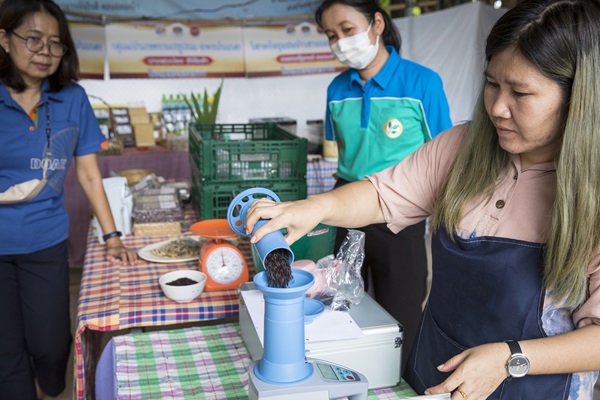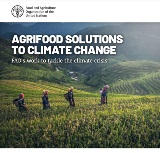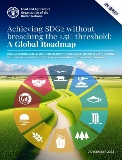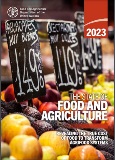Ghana
News

International Day of Awareness of Food Loss and Waste: FAO calls for circular model in agrifood systems
29/09/2023

Transforming agrifood systems requires changing policies, mindsets, and business models
18/01/2023

Investment opportunities and legislation frameworks on FLW. Some relevant FAO resources are available
30/08/2022
Food loss and waste (FLW) is a global burden with a negative impact on the economic, social, and environmental dimensions of sustainable development. The loss and waste of food suitable for human consumption hampers food security and nutrition and hinders the realization of the human right to ...
Articles
Amid food and climate crises, investing in sustainable food cold chains crucial
14/11/2022
The food cold chain has serious implications for climate change and the environment. Emissions from food loss and waste due to lack of refrigeration totalled an estimated 1 gigatonne of carbon dioxide (CO2) equivalent in 2017 – about 2 percent of total global greenhouse gas emissions.
Events
27/ 3
2024
UNEP Food Waste Index Report 2024 - Launch Event
Virtual Event, 27/03/2024
To mark the second annual International Day of Zero Waste, UNEP will launch its Food Waste Index Report 2024 on 27 March 2024. The report provides the latest global ...
29/ 3
2024
International Year of Millet: closing event
Hybrid Event, 29/03/2024
Through the Year’s observance, the unique nutritional qualities and agronomic traits of millets were demonstrated, thereby raising awareness and directing critically needed policy attention to their suitability for sustainable crop production systems, especially with minimal inputs and under adverse and changing climatic conditions. Additionally, key business opportunities were validated for di...
8/ 5
2024
2024 Food loss and waste masterclass: the basics
Virtual Event, 08/05/2024
The “2024 Food loss and waste masterclass series: the basics“ involves a number of virtual events targeted to youth that have an interest in reducing food loss and waste towards achieving agrifood system transformation and enhancing the sustainability of food supplies. The April 2024 session will cover FLW basic principles, but targeting those in European, African, North American and C...
Projects
Publications

Agrifood solutions to climate change – FAO's work to tackle the climate crisis
29/11/2023
Amid a worsening climate crisis and slow progress in cutting greenhouse gases, sustainable agrifood systems and practices can help countries and communities to adapt, build resilience and mitigate emissions. FAO is working with countries and partners at all levels to address the challenges of food security, climate change and biodiversity loss. But success in this area will ultimately require global commitment to significantly increasing the quality and quantity of climate finance.

Global Roadmap for Achieving Sustainable Development Goal 2 (SDG2) without Breaching the 1.5°C
10/12/2023
A comprehensive strategy spanning the next three years that encompasses a diverse portfolio of solutions across ten distinct domains of action. Enormous amounts of resources – land, water, energy and labour – are used to produce food. When food is lost or wasted, these resources go to waste as well, impacting the efficiency of food production. Reducing food loss and waste is one of the domains of action illustrated in this Roadmap.

The State of Food and Agriculture 2023 - Revealing the true cost of food to transform agrifood systems
07/11/2023
Agrifood systems generate significant benefits to society, including the food that nourishes us and jobs and livelihoods for over a billion people. However, their negative impacts due to unsustainable business-as-usual activities and practices are contributing to climate change, natural resource degradation and the unaffordability of healthy diets.
Multimedia
Take action to reduce food loss and waste (FLW) towards transforming global agrifood systems
29/09/2023
The International Day of Awareness of Food Loss and waste (IDAFLW) on 29 September 2023 makes a clear call to action for public and private entities to take action to reduce food loss and waste (FLW) towards transforming global agrifood systems and contributing to achieve the 2030 Agenda goals.
International Day of Awareness of Food Loss and Waste - UN Secretary General message | 29 September 2020
29/09/2020
António Guterres, UN Secretary-General on the occasion of the International Day of Awareness of Food Loss and Waste (29 September 2020)
1st International Day of Awareness of Food Loss and Waste - September 29
29/09/2020
When food is loss or wasted, all the resources that were used to produce this food -, including water, land, energy, labour and capital – go to waste. In addition, the disposal of food loss and waste in landfills, leads to greenhouse gas emissions, contributing to climate change.
How to tackle food loss and waste
14/10/2019
Although there may be an economic loss, food diverted to other economic uses, like animal feed, is not considered as food loss or waste, nor are the inedible parts of food products.
